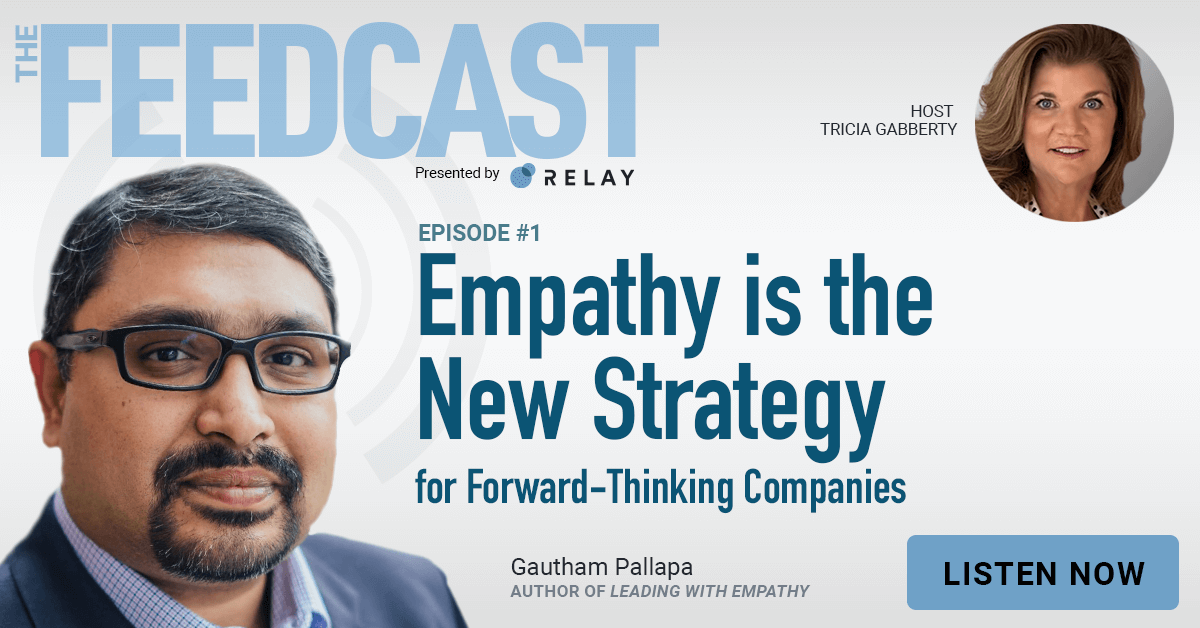The FeedCast
Episode #1:
Empathy is the New Strategy for Forward-Thinking Companies
Featuring Dr. Gautham Pallapa, Ph. D.

Empathy is not a word that you would typically associate with business strategy and customer engagement, yet, leading with empathy could be a difference maker for organizations in terms of building trust, driving loyalty, and keeping employees and customers alike happy. In fact, a recent Forbes article cited empathy as the “most important leadership skill according to research.” To see the impact that empathy and an empathy-driven culture can have on an organization, it is important to have a more thorough understanding of the term. Empathy is the ability to emotionally understand what others feel, see things from their point of view, and imagine yourself in their position. And further, there are three types of empathy, and understanding their distinctions could mean the difference between growing or losing customers. The three fundamental types of empathy are:
- Cognitive Empathy – the ability to understand what a person is going through or feeling without any emotional connection
- Emotional Empathy – the ability to share feelings and gain a deeper understanding of a person
- Compassionate Empathy – the ability to have emotional empathy, but also take practical actions to do something to help others
In our recent FeedCast episode, Dr. Gautham Pallapa, Ph. D. and author of Leading With Empathy: Understanding the Needs of Today’s Workforce, makes a case for why it is critical to a business’s success to instill the third type –compassionate empathy—into their culture. It is the presence of this critical skill that enables businesses to win and retain customers.
Meaningful engagement, which can help improve customer sentiment and drive retention, is about building trusting relationships with your customers, members, patients, clients, and whatever community you serve. Compassionate empathy is a foundational cornerstone to the trust and authenticity necessary to drive meaningful customer engagement.
“Compassionate empathy is one of the most active forms of empathy, and it’s important,” says Dr. Pallapa. “It’s not just feeling what the other person is feeling; it’s feeling it and then doing something about it.” As an example, Dr. Pallapa points to mentoring. “A good mentor and mentee will establish an emotional relationship first that forms connection and empathy. Then they will work together to identify practical approaches to eliminate or reduce the challenges the mentee is going through. That is compassionate empathy.”
When a company employs an empathy-driven culture, that same connection and understanding given in the mentoring example will flow throughout the organization. This makes workers feel heard and understood, transcending beyond the organization’s walls. Compassionate empathy also drives customer engagement by making customers feel heard, which elevates the brand in the consumer’s mind. Empathy allows companies to connect with consumers on an emotional level—and that’s what people want from the companies that they interact with: someone who understands them and can help them solve their problems.
Empathy allows companies to connect with consumers on an emotional level—and that’s what people want from the companies that they interact with: someone who understands them and can help them solve their problems.
In this age of technology and the great digital transformation, how do we get empathy to extend from human to machine to human? It’s clear that AI is an important tool for businesses today—but it isn’t enough on its own, and technology is often only as good as the inputs it’s given. AI can help automate many tasks, but at some point, a human element is necessary if those tasks aren’t done properly or aren’t going according to plan. According to Dr. Pallapa, “technology is not the panacea” but rather an additive that can maintain an element of human touch.
The good news is that creating a culture of compassionate empathy can be undertaken by any size organization at any time and with relatively little cost. Per Dr. Pallapa, the answer is as simple as making a mind shift. “The best and fastest thing an organization can do is to empower their people by better understanding and listening to their workers about the pain points they are encountering. This makes the employee feel empowered, the leader is seen as authentic, and customer service is enhanced.”
You can listen to the full conversation with Dr. Pallapa by using the link above, and to stream on your own, search “FeedCast” on all streaming platforms that support podcasts.
To learn more about the Relay Feed and how it can help with customer engagement initiatives, reach us at: sales@relaynetwork.com
Sign up here to receive a link to the FeedCast directly to your inbox each month.